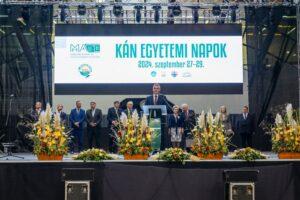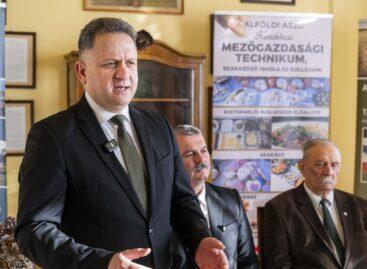Domestic animal husbandry can be renewed with the effective use of rural development resources
The solution to alleviating the problems plaguing domestic animal husbandry and improving the sector’s competitiveness is to use the ever larger rural development resources as efficiently as possible – emphasized György Zsolt Papp, President of the National Chamber of Agriculture, at the KÁN University Days held at the Kaposvár Campus of the Hungarian University of Agricultural and Life Sciences.

(Photo: NAK)
Livestock breeding has been going through a difficult period, and even today the players in the sector have to face serious difficulties. The drought affecting agriculture, the economic problems caused by the war raging in our neighborhood and the epidemic animal diseases are constantly testing animal breeders, said the NAK president at the opening of the KÁN University Days in Kaposvár. György Zsolt Papp emphasized that the effective use of subsidies can be the way out of this situation. Thanks to the national co-financing, which was increased to a maximum of 80% by the Hungarian government, the renewal of the sector is ensured by a greater number of tender resources than ever before. The tenders that have already been opened, as well as those that will be opened in the near future, provide, among other things, the opportunity to develop small and large livestock farms and to promote processing. These resources must be used as efficiently and purposefully as possible.
September 29th, St. Michael’s Day, has been the time of collection and accounting in animal husbandry for centuries, since 2020 the day of livestock breeders in Hungary
On this day, the tradition and values of domestic animal husbandry come to the fore. However, not only at this time, but every day of the year, we must thank animal breeders for their self-sacrificing work, thanks to which they continuously supply consumers with reliable, high-quality food, emphasized the NAK president. At the conference entitled “20 years in the EU: the balance sheet of Hungarian livestock breeding”, organized as part of the KÁN University Days, the NAK president said that in recent years, about HUF 500 billion in subsidies have reached livestock breeders. This provides a solid background for the production of quality raw materials, but the promotion of processing and the increase of added value could further improve the efficiency of the sector’s actors. Hungary has the largest number of animal-based legal titles in the European Union, and animal welfare subsidies have been put on new foundations, all of which greatly help the work of animal breeders.
In the field of sustainable farming, Hungary can boast of serious results in international comparison
Agro-environmental management or organic production takes place on 1.5 million hectares, which places us on the podium in the EU, and our country is among the top 10 countries in the world. This can be further enhanced by taking advantage of the opportunities offered by agricultural digitalization, which simultaneously creates the foundations for environmentally conscious and efficient farming and food security, added György Zsolt Papp.
NAK
Related news
The government provides significant funding to support the development of crop dryers
🎧 Hallgasd a cikket: Lejátszás Szünet Folytatás Leállítás Nyelv: Auto…
Read more >








